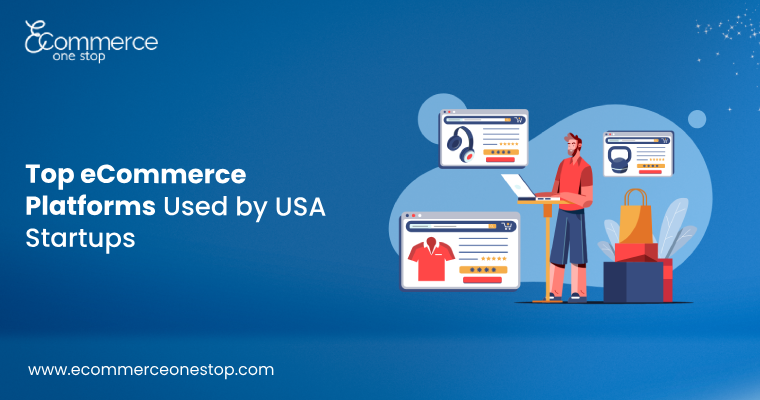The global e-commerce market was valued at
$25.93 trillion in 2023 and is expected to hit
$83.26 trillion by 2030, growing at an
18.9% CAGR (
Garden View Research).
For USA startups,
choosing the right eCommerce platform is a critical decision that can shape your business’s future. This blog explores the top platforms powering USA startups, backed by the latest trends and statistics.
Whether you’re launching a new venture or scaling an existing one, we’ll help you find the platform that fits your needs. Many startups partner with an
eCommerce website development company in India to build customized, cost-effective stores, let’s see which platforms they’re choosing.
Get Your Project Started
Book a free consultation with our Ecommerce experts.
Connect Now

Why eCommerce Platforms Matter for Startups
eCommerce platforms are the foundation of any online store, offering tools to create, manage, and grow your business. For startups, the right platform balances ease of use, affordability, and scalability.
With 2.77 billion online shoppers globally (
Sellers Commerce, 2025) and eCommerce accounting for 21% of retail sales worldwide, selecting a platform that aligns with your goals is essential. Factors like cost, customization, and integration capabilities are key, especially for startups with limited resources.
What Are The Top eCommerce Platforms for USA Startups in 2025?
1. Shopify
Shopify is a powerhouse, holding about 29% of the USA eCommerce platform market share (
Yaguara, 2025). Its intuitive setup and robust features make it a favorite among startups like Grove Collaborative and Allbirds. Shopify’s AI tools help with product descriptions and site design, perfect for founders with minimal technical skills.
Key Features:
- User-friendly interface
- Over 8,000 apps for customization
- AI-powered content creation
- Secure payment gateways
- 24/7 customer support
Pros:
- Quick and easy setup
- Scales well for growing businesses
- Strong community and resources
Cons:
- Transaction fees on lower plans
- Advanced customization may require coding
Why Startups Choose It: Shopify’s balance of simplicity and scalability makes it ideal for startups aiming to launch fast and grow steadily. Many work with an eCommerce website development company to enhance Shopify stores with custom features.
2. Wix
Wix is a versatile website builder with strong eCommerce capabilities, holding a 5.5% market share (
W3Techs). Its drag-and-drop interface lets startups create stunning stores without coding, making it a go-to for design-focused businesses.
Key Features:
- Drag-and-drop builder
- Customizable templates
- App market for added functionality
- Built-in marketing tools
- Mobile-optimized designs
Pros:
- Highly intuitive design tools
- Affordable pricing
- Great for small to medium stores
Cons:
- Less scalable for large businesses
- Limited advanced features
Why Startups Choose It: Wix is perfect for startups prioritizing a beautiful, low-maintenance store. It’s ideal for those who want to get online quickly without technical hurdles.
3. WooCommerce
WooCommerce, a free WordPress plugin has a 15% market share in the USA (
Oberlo, 2024). Its open-source nature offers unmatched flexibility, making it a top choice for startups already using WordPress or needing custom solutions.
Key Features:
- Smooth WordPress integration
- Extensive customization options
- Large plugin ecosystem
- No transaction fees
- Strong SEO capabilities
Pros:
- Free (excluding hosting costs)
- Highly customizable
- Ideal for content-driven sites
Cons:
- Requires technical knowledge
- Hosting and maintenance costs add up
Why Startups Choose It: WooCommerce suits startups comfortable with WordPress or those needing tailored features. Partnering with the best eCommerce website development company can simplify setup and customization.
4. Squarespace
Squarespace is renowned for its sleek templates and user-friendly interface, with a 15% market share in the USA (
Oberlo, 2024). It’s a great fit for startups that value aesthetics and content marketing.
Key Features:
- Stunning, responsive templates
- Integrated blogging and marketing tools
- Inventory management
- Secure checkout
- Reliable customer support
Pros:
- High-quality design options
- All-in-one platform
- Great for content-rich stores
Cons:
- Limited third-party integrations
- Less flexibility for complex customizations
Why Startups Choose It: Squarespace is ideal for startups wanting a visually appealing store with minimal effort, especially those leveraging content to drive sales.
5. BigCommerce
BigCommerce is built for growth, offering advanced features without transaction fees. It’s a strong choice for startups with ambitious plans, supporting multi-channel selling and large inventories.
Key Features:
- Scalable architecture
- Multi-channel integration
- Advanced SEO tools
- No transaction fees
- 24/7 support
Pros:
- Feature-rich platform
- Highly scalable
- Strong B2B capabilities
Cons:
- Steeper learning curve
- Higher pricing for advanced features
Why Startups Choose It: BigCommerce is perfect for startups expecting rapid growth, offering robust tools to manage complex operations from the start.
How To Choose the Right Platform?
Selecting the best platform involves weighing your startup’s needs:
- Budget: Consider platform fees, hosting, and app costs.
- Technical Expertise: Assess your team’s technical skills.
- Scalability: Ensure the platform can handle growth.
- Features: Identify must-have features like payment gateways and marketing tools.
- Customization: Decide how much control you need over design and functionality
Many startups collaborate with an
eCommerce website development company in India to build tailored solutions, leveraging cost-effective expertise to meet specific needs.
Conclusion
The eCommerce landscape in 2025 offers immense opportunities for USA startups. Shopify, Wix, WooCommerce, Squarespace, and BigCommerce stand out as top choices, each with unique strengths. By understanding your needs and leveraging expert support, you can choose a platform that sets your startup up for success.
Ready to launch your eCommerce store?
Contact our team, a leading eCommerce website development company in India, to build a customized, high-performing online store on the platform of your choice.
FAQs
1. What is the best eCommerce platform for a small startup?
Wix and Squarespace are great for small startups due to their ease of use and affordability. Shopify is also a strong choice for its balance of features and scalability.
2. Can I switch eCommerce platforms later if my business grows?
Yes, but it can be complex and time-consuming. Choose a scalable platform early to avoid migration challenges.
3. Do I need technical skills to use these platforms?
Wix, Squarespace, and Shopify require minimal technical knowledge. WooCommerce and BigCommerce may need more expertise for advanced customizations.
4. What are the costs associated with these platforms?
Wix and Squarespace start around $20-$30 per month, Shopify at $29 per month. WooCommerce is free but requires hosting ($5-$50/mo). BigCommerce starts at $29 per month.
5. How important is mobile optimization for my eCommerce store?
With 60% of global eCommerce sales coming from mobile devices in 2023, mobile optimization is critical for user experience and sales.



